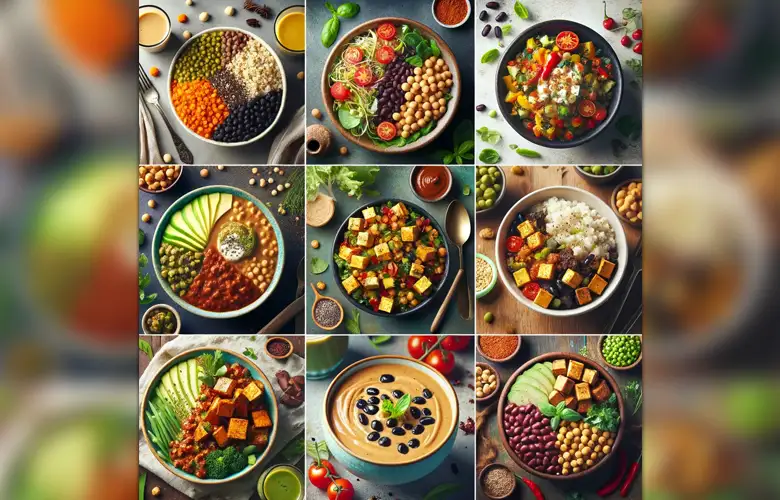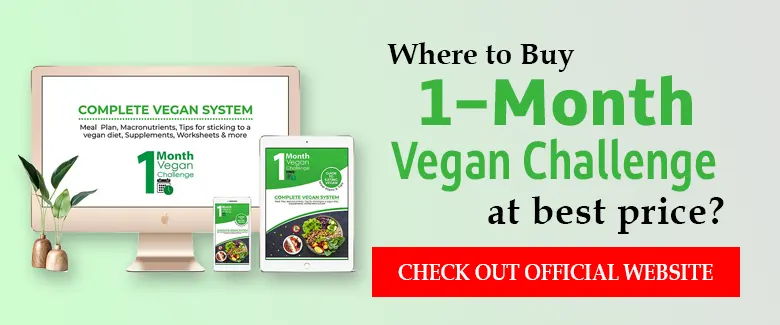
Trying a vegan diet is a smart choice for your health, the planet, and animals. But where do you start? We’re here to guide you through the process step by step.
In this article, we’ll clarify why you should want to go vegan, help you understand the nutrients you need, and provide tips for planning balanced vegan meals.
Plus, we’ll introduce you to a handy 30-day meal plan to make your transition smoother. Going vegan can bring remarkable changes to your body and the environment. Let’s get started on this exciting journey!
Steps to Get Started With Your Vegan Diet?
Step 1: Clarify Your Motivation
Before you start, identify your core reasons for choosing a vegan diet. Whether it’s for health (lowering cholesterol, reducing the risk of heart disease), environmental (lowering carbon footprint, conserving water), ethical (animal welfare, reducing animal suffering), or personal reasons (culinary exploration, dietary challenge), a clear motivation will keep you committed.
Step 2: Nutritional Knowledge
Understand the key nutrients in a vegan diet:
- Protein: Plant-based sources like tofu, tempeh, legumes, and quinoa can provide ample protein.
- Iron: While plant-based iron is non-heme and less absorbable, pairing iron-rich foods with vitamin C-rich foods enhances absorption.
- Calcium: Sources include fortified plant milk, leafy greens, and fortified foods.
- Vitamin B12: It’s essential for vegans, as it’s mainly found in animal products. Consider supplementation.
- Omega-3 Fatty Acids: Flaxseeds, chia seeds, and walnuts are rich sources.
Step 3: Balanced Meal Planning
Create balanced vegan meals:
- Whole Grains: Brown rice, quinoa, whole wheat pasta.
- Legumes: Lentils, chickpeas, black beans.
- Fruits and Vegetables: A rainbow of colors for diverse nutrients.
- Nuts and Seeds: Almonds, flaxseeds, pumpkin seeds.
- Plant-Based Proteins: Tofu, tempeh, seitan.
- Fats: Avocado, olive oil, nuts.
Step 4: Having a Good Plan
Did you know?
70% of new vegans abandon the vegan lifestyle less than a month after starting. Many times going vegan feels too much to handle. One of the most common reasons why people quit a vegan diet is not having a good plan.
The solution: We have tried the best cookbooks available in the market. We also made our experts and community give a review. The recipe book by Jeff Mitchell ‘1-Month Vegan Challenge’ came out as a standout option.
1 Month Vegan Challenge cookbook is awarded Best Overall because it offers everything a beginner must have with guidance to succeed.
Review the book: 1 Month Vegan Challenge by Jeff Mitchell
What Should a Cookbook Offer?
- 30-Day Step-by-Step Meal Plan
- Nutritional Insights
- Tips to Stock Your Kitchen
- Meat and Dairy Substitutes
- Tips to Approach Your Unique Fitness Goals
- Tips To Portion Your Food
- Vegan Supplements And Multivitamins Insights
- Eating Out Strategies
The points mentioned above will help you choose your 30-day meal plan guide. Now you can go vegan making impactful changes in the environment, in your health, and contributing to saving the lives of silent creatures.
Step 5: Reflect and Celebrate
Regularly reflect on your vegan journey:
Celebrate your successes, whether they are health improvements, culinary achievements, or contributing to a more sustainable planet. Keep a journal to track your progress, recipes, and memorable moments.
Consider using a progress tracker app or website to help you stay on course. In the USA, some popular and free options include:
- MyFitnessPal: A widely-used app that tracks your food intake, exercise, and nutritional goals. It has a comprehensive database of foods and a user-friendly interface.
- Cronometer: A valuable tool for tracking not only your calorie intake but also your micronutrient intake. It provides detailed insights into your nutrient consumption.
- HappyCow: If you’re dining out and want to find vegan-friendly restaurants and options near you, HappyCow is a fantastic app and website. It provides user-generated reviews and recommendations.
All three of the mentioned apps and websites are available for free with basic features. This detailed guide gives you a solid foundation for starting and thriving on a vegan diet.

Why You Should Go Vegan?
When you decide to go vegan, your body undergoes remarkable changes right from the start. These transformations may not be widely known, but they are both unique and valuable for anyone considering a vegan lifestyle.
Digestive Revival
Going vegan often means embracing a diet rich in fiber from fruits, vegetables, and whole grains. This mix of fiber can immediately enhance your digestion. Your bowel movements may become more regular, and you might notice reduced bloating.
Energy Boost
Within a short time of adopting a vegan diet, many people report an increase in energy levels. This could be due to the lighter nature of plant-based foods that are easier to digest, leading to improved vitality.
Weight Loss
If you’re transitioning to a well-balanced vegan diet, you might experience a gradual shift in your weight. Many find that they naturally shed a few pounds as they consume fewer calories from animal fats.
Improved Skin Radiance
The abundance of antioxidants in plant-based foods can quickly promote clearer and more radiant skin. Some people notice a reduction in acne and a healthier complexion.
Balanced Blood Sugar
A well-structured vegan diet can lead to better blood sugar control. Many people witness immediate stabilization in their blood sugar levels.
Remember, these changes can vary from person to person. The key is to adopt a balanced and well-planned vegan diet to maximize these immediate benefits. Always consult with a healthcare professional or registered dietitian before making significant dietary changes.
Going vegan can be a transformative journey, and understanding these initial changes can help you embrace it with confidence.
What are the Best Protein-Rich Foods for Weight Loss?
Let’s check out the vegan foods that are rich in protein and low in carbs. These foods are a valuable addition for those looking to lose weight.
Hemp Seeds
- Protein: Approximately 10g per 3 tablespoons
- Carbs: Just 1g per 3 tablespoons
- Fact: Hemp seeds are a complete protein source, containing all nine essential amino acids.
Seitan (Wheat Gluten)
- Protein: Around 21g per 3.5 ounces
- Carbs: Approximately 4g per 3.5 ounces
- Fact: Seitan is often called “wheat meat” because of its meaty texture and high protein content.
Tempeh
- Protein: 21g per 3.5 ounces
- Carbs: Just 7g per 3.5 ounces
- Fact: Tempeh is fermented, making it easy to digest and rich in probiotics.
Edamame (Young Soybeans)
- Protein: 8g per 1-cup serving (cooked)
- Carbs: Approximately 8g per 1-cup serving (cooked)
- Fact: Edamame is a versatile and protein-rich addition to salads and stir-fries.
Lupini Beans
- Protein: About 15g per 1/2 cup (canned)
- Carbs: Just 3g per 1/2 cup (canned)
- Fact: Lupini beans are a Mediterranean delight, low in carbs and high in protein.
Tofu
- Protein: Approximately 15g per 3.5 ounces
- Carbs: About 2g per 3.5 ounces
- Fact: Tofu is a versatile soy-based protein that can be used in various dishes, from savory to sweet.
Lentil Pasta
- Protein: Around 21g per 3.5 ounces (cooked)
- Carbs: Approximately 24g per 3.5 ounces (cooked)
- Fact: Lentil pasta offers an alternative with high protein content and fewer carbs.
These lesser-known vegan protein sources can be a valuable addition to your diet, whether you’re a vegan or simply looking to incorporate high high-protein vegan diet.
Enjoy the nutritional benefits and delicious flavors these foods offer as you work toward your health and dietary goals.
Final Words
Making the switch to a vegan diet can bring many positive changes to your life. You’ll enjoy better digestion, more energy, and even some weight loss. Your skin might look healthier too.
Make your vegan journey a success by taking the “1 Month Vegan Challenge” cookbook by Jeff Mitchell.
Remember, everyone’s experience is different, so it’s important to plan your vegan diet well. But don’t worry, there are plenty of delicious and nutritious vegan foods to explore.
Just take it one step at a time, and consult with a healthcare professional or dietitian if you have any concerns. Going vegan is a journey worth taking, and with the right knowledge, you can embrace it confidently.
Sources
Glozine avoids using tertiary references. We have strict sourcing guidelines and rely on peer-reviewed studies, academic researches from medical associations and institutions. To ensure the accuracy of articles in Glozine, you can read more about the editorial process here.
- PREVENTING FAILED VEGANS Insights from Ginny Messina, the Vegan RD - https://vegfund.org/blog/ginny-on-preventing-failed-vegans
- Nutrition and healthy eating - https://www.mayoclinic.org/healthy-lifestyle/nutrition-and-healthy-eating/in-depth/fiber/art-20043983
- Vegan diet: nutritional components, implementation, and effects on adults’ health - https://www.frontiersin.org/articles/10.3389/fnut.2023.1294497/full
- The Impact of a Vegan Diet on Many Aspects of Health: The Overlooked Side of Veganism - https://www.ncbi.nlm.nih.gov/pmc/articles/PMC10027313/
- A plant-based diet for the prevention and treatment of type 2 diabetes - https://www.ncbi.nlm.nih.gov/pmc/articles/PMC5466941/

Glozine is a platform where we review and recommend products related to health, technology and more. When it comes to purchasing decisions, our journalists combine independent research with extensive testing to save your time and money. We’ll help you get it right, whether it’s finding an amazing product or getting useful advice.
Review this product & share your experiences with other customers. Don't see your question? Ask away!



Seamless Vegan Transition: My Experience...
The 1 Month Vegan Challenge truly revolutionized my approach to plant-based eating. With its meticulously crafted meal plans and organized shopping lists, adopting a vegan lifestyle felt effortless. This challenge has not only transformed my diet but also sparked a newfound passion for sustainable living.